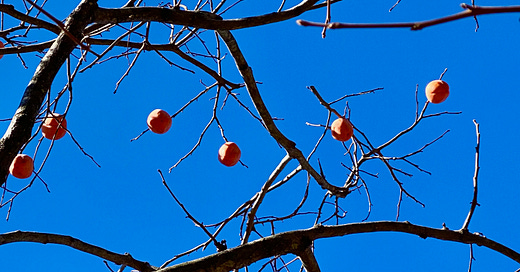Recently, I bemoaned my lack of persimmons. I do not grow them or really much of anything anymore, so I rely on the generosity of nature and friends to provide. I had missed the harvest, if there had even been a harvest, which meant giving up a tradition. The last of last year’s frozen pulp and the memory of the fruit’s subtle, honeyed sweetness would have to suffice for another year. It made me sad.
It was more than persimmons. It had been a difficult season. Sanity-sucking mosquitoes and politicians, rising costs, gun violence, Covid. Rain when more rain was the last thing we needed. Sorrow when more sorrow was the last thing we needed. Farmers lost crops. Lovers lost partners. Extraordinary people lost their lives - people I wanted so much to still be here, because the world desperately needed them. Because I needed them. It was bad.
But, not entirely. In late spring, keen as barn swallows at dawn, we had feasted on fresh fava beans. The cherry tomatoes had a banner year. We kept bowls of them on the counter and in the refrigerator, inhaling them like oxygen. Our cucumbers succeeded for the first time in forever. There were a few Chesapeake crabs. Not many, but enough to remind us why we miss them when they’re gone.
On a woodside walk in late November, Margaret discovered lion’s mane mushrooms and shared the five-pound harvest. We sautéed them and turned them into potluck dishes. I put some in the dehydrator to prolong the bounty. They weren’t persimmons, but the enchanting wildness of them helped turn the spotlight off my scarcity thinking.
Priscilla made a run for apples from a farm in Pennsylvania, whose stewards manage the orchard with a level of environmental sensitivity hard to come by in our humid, disease-prone locale. I went to her homestead to collect some and along the driveway, on the way out, passed a small tree with dozens of dusky, orange globes dangling from leafless limbs like vintage Shiny Brites. Persimmons!
Back home and heartened, I reached out to John, whose Gionbo tree had once supplied us with abundant harvests. In future, he offered gently, I should call him in October. His forty-year-old tree was close to its end, succumbing rapidly now to borers. But, yes, he said. Yes! He still had a few persimmons. They were in the uppermost branches, too high for him to reach, but I was welcome to try collecting what I could.
It took two of us, an eight-foot step ladder, an extension trimmer, and the deftness required to catch baseball-sized persimmons as they fell. In an hour, Jim and I had gathered enough for holiday pudding and sweet bread, for fruit leather and fresh eating, enough to put by for another day, enough to give away. We talked about how we had nearly missed them. We talked about our food village. And I discovered, all over again, how it is possible that there will always be enough. That was very, very good.
~Elizabeth





Thank you. It is so easy to get discouraged precisely by the things you mention. I’m grateful for plants for showing the way of hope. Thank you for the uplift this morning.
The stunning photo at the end is perfect. When we are downcast, it is difficult to think about looking up. Upcast, if you will. Look up! There might be a sign of hope. Or persimmons!
Just before reading this, I came across a quote in the New Yorker:
"Hope is the pillar that holds up the world," Pliny the Elder is supposed to have observed. "Hope is the dream of a waking [person]." I always read your pieces at least twice, always once out loud, even if only just to myself. Your words ring. Thanks.